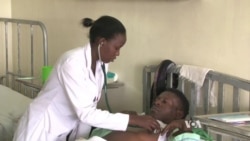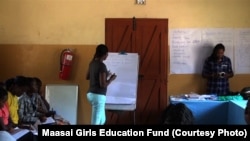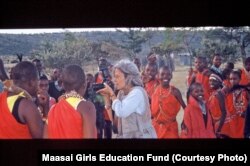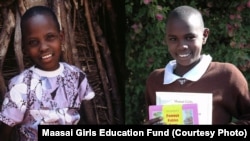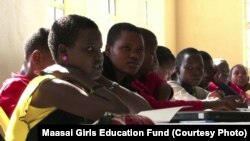Sometimes it takes a village. But sometimes it takes the concerted dedication of concerned people thousands of miles away to help empower women.
That's how Gloria Kotente Mumeita, a medical student from Kenya, was able to come to the U.S. this past fall for eight weeks of hands-on medical experience at Suburban Hospital and the National Institutes of Health in Bethesda, Maryland.
As part of her training at Suburban, Mumeita learned how to care for trauma patients under the guiding hands of Dr. Dany Westerband, medical director of trauma services at the hospital, which is one of just nine trauma centers in the state of Maryland that is specifically designed and equipped to handle medical emergencies.
Westerband is one of several physicians who sponsored and mentored Mumeita.
The Kenyan medical student says she has learned a great deal during her time in the U.S. and hopes to share that new-found knowledge with her peers back home.
“My experience here has been great, the doctors are great, I’ve gotten to do a lot of things which I wouldn’t have done in my country,” she said. “I’ve learned how to use an ultrasound to scan patients during an emergency and that is a program we don't have in my school and that's a program I’d love to start in the future.”
An unusual journey
Seeing a young woman receive medical training is not an unusual sight in a large hospital like Suburban, but it is, in this case. Mumeita is a Maasai…an ethnic patriarchal tribe in Kenya and Northern Tanzania, in which less than half of all girls attend primary school, and only one percent go to college.
“A Maasai girl doing medicine in my country is a big deal," she said tearfully. "Most of the time I get that question, ‘you are Maasai, and you’re in med school, how did you get here?’ Even in Kenya. It’s been a great journey for me.”
Mumeita's journey began when she learned about the Maasai Girls Education Fund – a U.S-based organization with offices in Kenya's Kajiado County. It provides young Maasai women and girls with scholarships – based on need -- for free education at boarding schools in the country.
It was founded in 1999 by Barbara Shaw, an American who believed that educating girls will empower them, their families and their communities, and lift them out of poverty. “If you educate a woman, it's proven over and over again, you have higher literacy, better health, better nutrition, greater economic stability and the entire community is better,” Shaw often said.
Dr. Westerband knew the American visionary well.
“Of all the programs that I’ve been exposed to and heard about, this initiative led by the Maasai Girls Education Fund is just mind-boggling in terms of value and what they can actually do for a community like Gloria’s community back in Kenya,” he said.
Shaw died in 2013, but her daughter, Tracey Pyles, is continuing her mother’s work. She recalled, “It started with two little girls that she first met while on a photography project in Kajiado district of Kenya and staying among the Maasai in their village." The number of girls helped by the organization has now grown to more than 150.
Mumeita is the first to go to medical school, and train at Suburban hospital, where Pyles works as an emergency physician.
“Someone like this, who has the heart that Gloria has, and the desire to go back to her home and make a difference, needs in my opinion, to be invested in, supported, given every opportunity to make the most," said Pyles, "because what she has the chance to do when she goes home…is incredible.”
The organization has proven that girls who go to school are less likely to be forced into early marriage and other cultural practices. “We have rescued girls as young as nine who were already married," said Pyles, "and also from FGM; female genital mutilation, which is still something that is practiced among the Maasai.” In fact, 90 percent of Maasai girls are circumcised by the age of 12.
The new Maasai warrior
But that is all changing, thanks to the organization's guiding philosophy to help girls in every way they can.
There are many instances, captured on videotape, of young Maasai women singing and dancing with joy because of their rescue through education from early marriage and FGM.
And thanks to the organization’s community programs, attitudes toward them are also changing - especially their fathers' views, says Pyles. “It's only as these girls come back, educated, teachers, doctors, lawyers... that's when they're coming to see the value of educating their daughters.”
A good example is Lucy Ntayia, a graduate of the program who is now its Kajiado office director.
“This new generation of Maasai girls who are now getting an education; they are now showing their community that they are bringing a lot of empowerment and they are showing their community that it is not just about a onetime dowry but they can do a lot for themselves and for their families and for their country,” she said.
Pyles noted, "It's hard to overcome strong cultural beliefs and ingrained practices, you're never going to do it by telling people that they’re wrong or bad, but by demonstrating and showing people how their own lives can be better, that's the way to effect change.”
Gloria Kotente Mumeita is back in Kenya now, spending time with her family and friends, and completing her fifth and final year of medical school at the University of Nairobi School of Medicine.
“For me, being a doctor would just have remained a dream," she said. "But now it’s a reality.”
March 8th is International Women’s Day.




